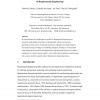128
click to vote
JMLR
2010
14 years 8 months ago
2010
This paper describes an approach to constructing a probabilistic process model representing knowledge worker activity out of a log of primitive events, such as e-mails, web page v...
164
click to vote
FIT
2010
14 years 9 months ago
2010
Business processes have to adopt the changes driven by the market to remain competitive. This requires improvement of business processes, which can be carried out by understanding...
183
click to vote
IS
2011
14 years 9 months ago
2011
Abstract. Process mining allows for the automated discovery of process models from event logs. These models provide insights and enable various types of model-based analysis. This ...
140
click to vote
ESWA
2011
14 years 9 months ago
2011
Business process models are becoming available in large numbers due to their popular use in many industrial applications such as enterprise and quality engineering projects. On th...
155
click to vote
SMR
2010
15 years 13 days ago
2010
Usually, for a particular business process different variants exist. Each of them constitutes an adjustment of a reference process model to specific requirements building the proc...
131
click to vote
OTM
2010
Springer
15 years 14 days ago
2010
Springer
Over the past several years, the artifact-centric approach to workflow has emerged as a new paradigm of business process modelling. It provides a robust structure of workflow and s...
122
click to vote
ER
2010
Springer
15 years 18 days ago
2010
Springer
In the light of an increasing demand on business process compliance, the veri
cation of process models against compliance rules has become essential in enterprise computing. To be ...
126
click to vote
IJSEKE
2002
15 years 1 months ago
2002
In current literature few detailed process models for Requirements Engineering are presented: usually high-level activities are distinguished, without a more precise specification...
139
click to vote
FGCS
2002
15 years 1 months ago
2002
Initial versions of MPI were designed to work efficiently on multi-processors which had very little job control and thus static process models. Subsequently forcing them to suppor...
126
click to vote
DSS
2002
15 years 1 months ago
2002
A thorough understanding of the way in which existing business processes currently practice is essential from the perspectives of both process reengineering and workflow managemen...


